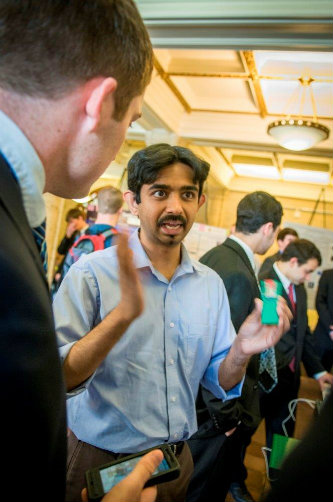Cybersecurity researchers enlist to protect power grid

Professor Rick Blum (center) with Professors Douglas Frey and Shalineee Kishore at Lehigh University's 2012 "Toward the Smart Grid" research symposium.
Researchers in Lehigh’s Integrated Networks for Electricity research cluster are part of a new center that aims to develop new technologies to protect the nation’s power grid from cyber attacks.
The center is made possible by a $12.2 million grant to Lehigh and four other universities from the U.S. Department of Energy (DOE). The award will be supplemented with $3.3 million in matching funds from the participating schools.
The goal of the initiative is to develop and test new technologies to help modernize the U.S. electrical power grid—the network of generating stations and transmission lines that produce and distribute electricity to homes, businesses and other users across the nation.
Researchers will identify and develop solutions for vulnerabilities across the grid. Objectives include protecting core power grid controls and communications infrastructure, building security and privacy protection into components and services, and providing security management capabilities and security testing and validation.
The team of researchers is led by the University of Arkansas and consists of experts in power systems engineering and in the computer science of cybersecurity from Lehigh and Arkansas, the University of Arkansas at Little Rock, Carnegie Mellon University and Florida International University. The Arkansas Electric Cooperative Corp. will serve as an industry partner.
Lehigh faculty members represent the largest number of investigators involved in the project. The group includes Rick S. Blum, the Robert W. Wieseman Research Professor of Electrical Engineering; Liang Cheng, associate professor of computer science and engineering; Mooi Choo Chuah, professor of computer science and engineering; Boris Defourny, assistant professor of industrial and systems engineering; Shalinee Kishore, associate professor of electrical and computer engineering; Alberto Lamadrid, assistant professor of economics; Wenxin Liu, assistant professor of electrical and computer engineering; Larry Snyder, associate professor of industrial and systems engineering; and Parv Venkitasubramaniam, assistant professor of electrical and computer engineering.
“Cybersecurity for energy systems is universally recognized to be one of the most important challenges of the future,” says Blum, principal investigator of the Lehigh team.
“We are thrilled to be a part of this initiative, not only for the opportunity to address a key challenge of our time, but also for the benefits it will bring to Lehigh students, providing unique educational and research experiences that only a handful of universities in the world can offer.”
The Lehigh team will be involved in all aspects of the work and especially active in the following:
- Cybersecurity algorithm development and testing with the goals of protecting core power grid controls and operations;
- Building security and privacy protection into components and services including micro-grid assets, demand-side management, smart metering, as well as electric vehicles;
- Protecting communications infrastructure;
- Providing security management capabilities to address complex security operation beyond human capacity;
- Provisioning security testing and validation to evaluate the efficacy of protective measures.
The Integrated Networks for Electricity research cluster, formed in 2011, is composed of an interdisciplinary team of engineers, mathematicians and economists who play a central role in developing advanced electricity systems while minimizing their impact on the environment.
The cluster is focused on developing “Smart Grids”—which it defines as “the overlaying of a sophisticated information infrastructure atop the power infrastructure”—and on controlling and securing the three interrelated smart-grid flows of electricity, information and money.
Posted on:


